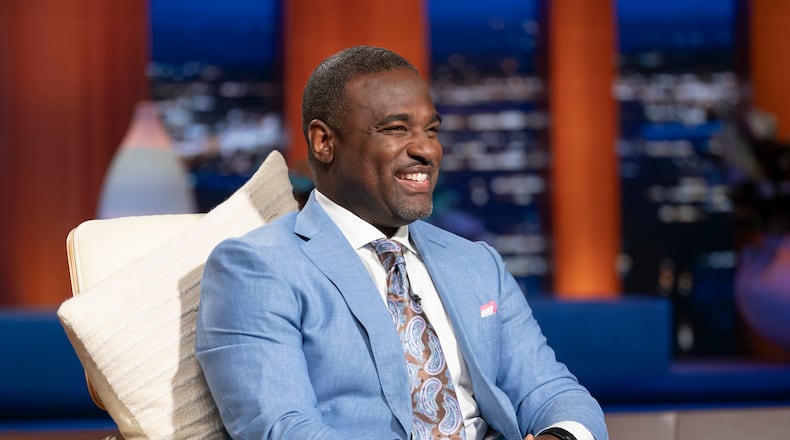Atlantan Rashaun Williams has been an aggressive venture capitalist, investing money in more than 170 companies in his lifetime.
His success caught the attention of Atlanta Falcons owner Arthur Blank, who asked him and three other successful African Americans (former Walgreens CEO Rosalind Brewer, gold medal gymnast Dominique Dawes and Atlanta filmmaker Will Packer) to be minority owners this year.
“I was fired up,” Williams said in a Zoom interview with The Atlanta Journal-Constitution. “There is no one who has done more for philanthropy than Arthur Blank.”
That level of attention also caught the eye of the producers at “Shark Tank” seeking guest sharks. (Other Atlantans who have shown up as guest sharks include comic and entrepreneur Jeff Foxworthy and Spanx founder and billionaire Sara Blakely.)
Williams will appear in three episodes, including the one airing Friday, Oct. 18, which will be available on Hulu the day after.
He will be working alongside vets like Barbara Corcoran, Lori Greiner, Kevin O’Leary and departing full-time shark Mark Cuban.
“They were looking to bring some new blood,” Williams said, “someone with a different perspective. I’m not a founder or operator. I’m a finance guy, a VC guy.”
But he has been teaching financial literacy for decades, running the nonprofit Kemet Institute since 2001. It’s that educational aspect he hopes to bring to viewers of “Shark Tank” as well.
“People watch this show because they want to learn how investors think and learn how to build their business,” he said. “They’ll learn a lot. All of the guys who want to be investors will get a mouthful.”
A Chicago native who grew up in a poor neighborhood, he applied for Morehouse College in Atlanta and was so determined to go, he drove 714 miles to Atlanta just to drop off the application at the school in person. Once he was accepted, he applied for 100 scholarships and garnered enough money to afford to pay for his education there.
After graduating from Morehouse, he worked at Goldman Sachs in Chicago as an investment banker and started his first venture capital fund of $10 million about 12 years ago. “The majority of that $10 million was mine,” he said. “I made $25,000 and $50,000 checks in 100 companies. My [cryptocurrency company] Coinbase investment of $50,000 netted me $20 million after it went public. But part of me wishes I had put in $250K or $500K!”
Other investments that turned gold for him include home security firm Ring (Amazon acquired the company for $1 billion in 2018); cloud storage company Dropbox, which went public in 2018; and financial services firm Robinhood Markets, which went public in 2021.
He also has many wealthy athletes and entertainers as clients who seek Williams’ advice as a “venture coach,” he said. “One of my favorites is 2Chainz,” he said. “I have been coaching him for eight years. We have invested in over 30 companies together. Awesome business guy and great founder.”
Williams said he has also worked with former Atlanta Falcons Roddy White and Julio Jones.
“They see that ownership makes a huge difference,” he said. “These guys are focused.”
He said on the show, he grills one entrepreneur so aggressively, the other Sharks think he is not interested when in fact, he was testing the person. He also studied the track record of the regular Sharks when it came to past investments and ended up teaming with Greiner on one deal in part because she had one of the best ones.
“I studied their companies for six months to see who had the most sales, who had exits, who had the best revenue growth rates,” Williams said.
And while he did another deal with O’Leary, he said mostly, “we were competing. We are going neck and neck to win these things.”
Williams, on the Zoom call, lifted the notebook he used to jot notes down during the show and revealed a set of standard questions he asked each entrepreneur such as revenue, growth rate, customer acquisition cost and debt. He had ample notes about each business.
‘There are different stages of companies out there,” he said. “Investors like the ‘go to scale’ phase. Being on TV and having a Shark can take you to the roof.”
He moved to Buckhead six years ago after his house burned down in Bel Air from wildfires in 2017. “My wife and I wanted to have a family,” he said. “We chose here because I went to Morehouse. This city plays such an important part of my history and identity. The weather is great here and we can get twice the value at half the price.”
IF YOU WATCH
“Shark Tank,” 8 p.m. Fridays on ABC with episodes available on Hulu
About the Author





